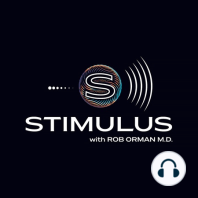62 min listen

50. The Wedge | An internal shift to thrive under duress
50. The Wedge | An internal shift to thrive under duress
ratings:
Length:
72 minutes
Released:
May 17, 2021
Format:
Podcast episode
Description
Investigative journalist and bestselling author Scott Carney is our guest as we discuss: what it means to be human, going deep in the Wim Hof method, benefits of cold exposure, climbing Kilimanjaro without a shirt, using The Wedge to change conversations with your limbic system, kettlebell throwing, and why you might want to embrace failure. Guest Bio: Scott Carney is an anthropologist, investigative journalist, author, and a seeker of both the fringes of human experience and the core of what makes us human. Scott has written four books to date, including The Enlightenment Trap, The Red Market, and What Doesn't Kill Us. Most recently, he authored The Wedge, which dives deeply into understanding the space between stimulus and response. Scott's work has been featured in many different magazines -- Wired, Mother Jones, Playboy, Foreign Policy, Men's Journal, National Public Radio. He has won the Payne Award for Ethics in Journalism and is a multi-finalist for the Livingston Award for International Journalism. This episode is in support of the Altruism in Medicine Institute, an organization founded by Barry Kerzin, a physician, teacher, author, and Tibetan Buddhist monk. The mission is to increase compassion and resilience among health care professionals and their patients. Compassion fatigue is a very real thing, especially in health care. Building your compassion muscle is one of the most potent tools not only for avoiding burnout, but for finding joy in what you do. We discuss: The common theme of Scott’s books -- what does it mean to be human? [05:00]; In The Enlightenment Trap, The Red Market, and What Doesn't Kill Us, Scott writes about organ trafficking, cults, and ice/cold exposure. His most recent book, The Wedge, is about how to change the way one reacts to different stimuli and how changing that reaction changes your physiology. Who is “The Iceman” Wim Hof and and why might cold water immersion lead to general resilience [09:10]; Wim Hof is a Dutch athlete who developed a method of ice water immersion and breathwork protocols that give him what appears to be superhuman powers. Wim claims that his techniques can boost the immune system and cure autoimmune disease. Scott was initially dubious of Wim’s assertions and was eager to meet him. He quickly learned that Wim’s program works. Extreme cold exposure combined with breathwork creates a stressful internal state and triggers a fight-or-flight response. With Wim Hof training, you tell yourself, “I can do this, the stress isn’t so bad”, and the amount of cortisol, adrenaline, and other stress hormones that are secreted is reduced. By being able to handle that stress, your physiology adapts and contributes to overall resilience. Link to the science behind the Wim Hof method. “We live in relatively static environments, having manipulated the environment to make us feel comfortable. Wim’s message is to get into places that make you feel uncomfortable from an environmental perspective and then learn to be OK with that. You start activating biological systems that have let us survive for all of the millennia before central heating and electric lighting.” The three elements of the Wim Hof method and how they relate to the wedge [15:10]; Deliberate cold exposure. A breath protocol where you do rounds of controlled hyperventilation followed by exhalation and a breath hold. (Note: the cold immersion and breathing protocols are not meant to be done concurrently.) Your mindset during the stressful states of cold or hypoxia. This mindset led Scott to the concept of the wedge. If you put a wedge between challenging stimuli and your brain’s response to it, it gives you an opportunity to realize that this is something you can do. “You can find the benefits of the wedge in everything you do, because you’re constantly interacting with the environment. That environment is sending sensations to your body, and you have a choice on how yo
Released:
May 17, 2021
Format:
Podcast episode